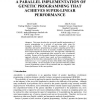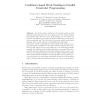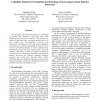399 search results - page 1 / 80 » Parallel evolutionary algorithms can achieve super-linear pe... |
125
click to vote
ISCI
1998
15 years 1 months ago
1998
: This paper describes the successful parallel implementation of genetic programming on a network of processing nodes using the transputer architecture. With this approach, researc...
125
click to vote
IPL
2002
15 years 1 months ago
2002
One of the main reasons for using parallel evolutionary algorithms (PEAs) is to obtain efficient algorithms with an execution time much lower than that of their sequential counter...
203
Voted
CP
2009
Springer
16 years 2 months ago
2009
Springer
The most popular architecture for parallel search is work stealing: threads that have run out of work (nodes to be searched) steal from threads that still have work. Work stealing ...
121
click to vote
ICPADS
2005
IEEE
15 years 7 months ago
2005
IEEE
New biological experimental techniques are continuing to generate large amounts of data using DNA, RNA, human genome and protein sequences. The quantity and quality of data from t...
ICPP
2006
IEEE
15 years 8 months ago
2006
IEEE
Providing QoS guarantees to the applications in a multi-institutional Grid is a challenging task. Although advance reservations (ARs) can provide QoS guarantees for the applicatio...



